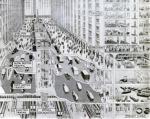Share/transport — the largely uncharted middle ground of low-carbon, high-impact,  available-now mobility options that span the broad range that runs between the long dominant poles of “private transport” (albeit on public roads) and “mass transport” (scheduled, fixed-route, usually deficit-financed public services) at the two extremes. The third way of getting around in cities? Come to Kaohsiung in September and let’s talk about sharing. Continue reading
available-now mobility options that span the broad range that runs between the long dominant poles of “private transport” (albeit on public roads) and “mass transport” (scheduled, fixed-route, usually deficit-financed public services) at the two extremes. The third way of getting around in cities? Come to Kaohsiung in September and let’s talk about sharing. Continue reading
Monthly Archives: July 2010
Musing: “Old Mobility” = mechanical solutions to biological problem
 I like this concept, and while by itself it may not move the earth I would like to invite your comments and suggestions on this formulation which, self-evident though it may seem, some of us at least may find of use from time to time. We need to get a firm handle on the reasons why old mobility thinking is proving so hard to dislodge. This quick characterization may be of help.
I like this concept, and while by itself it may not move the earth I would like to invite your comments and suggestions on this formulation which, self-evident though it may seem, some of us at least may find of use from time to time. We need to get a firm handle on the reasons why old mobility thinking is proving so hard to dislodge. This quick characterization may be of help.
In a conversation yesterday with Katherine Freund of ITNAmerica, during which we were discussing her participation in the forthcoming World Share/Transport Forum in Kaohsiung next month, the conversation rolled around as to the reasons why the narrow binomial choices which seem inevitably to frame the transport policy issues/choices in most places – i.e., either spend money to help cars or public transit as the two main options – are destined to fail. And in the process we eventually worked our way around to the phrase . . . Continue reading
Dancing around the carbon tax in the United States Senate
Climate and climate policy are more than moderately complicated issues, as we all are well aware. But at the end of the day we know too there are a certain  number of basic underlying truths that shape these issues and outcomes, which one either grasps or one does not. And in this regard, there can be little doubt that the most single powerful single lever available for slowing down climate damage is carbon-reduction — and by far the most powerful way to achieve this is through a well-fashioned carbon tax. You put a price on carbon emissions, a high price preferably, and you can be sure that they will come down. Economics 101. But say this to a hundred bright people, and 99 will immediately, without losing a beat, look you in the eye and start to list all the reasons why this cannot be done. Wrong! It can be done. Continue reading
number of basic underlying truths that shape these issues and outcomes, which one either grasps or one does not. And in this regard, there can be little doubt that the most single powerful single lever available for slowing down climate damage is carbon-reduction — and by far the most powerful way to achieve this is through a well-fashioned carbon tax. You put a price on carbon emissions, a high price preferably, and you can be sure that they will come down. Economics 101. But say this to a hundred bright people, and 99 will immediately, without losing a beat, look you in the eye and start to list all the reasons why this cannot be done. Wrong! It can be done. Continue reading
Let’s give cars more competition! New options for urban mobility
– by Paul Barter, National University of Singapore
What competition do cars have in your city? I don’t mean competition between Toyota, Ford or Hyundai. I don’t even mean competition betwee n cars and public transport for this morning’s work trips. I am talking about competition between a car-owning lifestyle and a set of alternatives that add up to a whole lifestyle, creating a complete ‘mobility package’ attractive enough to make car ownership feel optional. Continue reading
n cars and public transport for this morning’s work trips. I am talking about competition between a car-owning lifestyle and a set of alternatives that add up to a whole lifestyle, creating a complete ‘mobility package’ attractive enough to make car ownership feel optional. Continue reading
The Changing Context for NGO Campaigning
The consistent two-punch theme of World Streets is that (a) we are losing  the sustainability wars (no argument there, eh?) because (b) we are quite simply not very bright. Look, how complicated can it be? When it comes to the issues of sustainable transport we really do know what to do (i.e., get our act together and start to rip carbon out of the system, and do it now). But we are somehow not able to get our fundamental messages across. We also have this communication problem. So when someone like Keith Sutter from Sydney has an idea for us, well we listen and try to learn. Let’s have a look and see if we can learn something. Continue reading
the sustainability wars (no argument there, eh?) because (b) we are quite simply not very bright. Look, how complicated can it be? When it comes to the issues of sustainable transport we really do know what to do (i.e., get our act together and start to rip carbon out of the system, and do it now). But we are somehow not able to get our fundamental messages across. We also have this communication problem. So when someone like Keith Sutter from Sydney has an idea for us, well we listen and try to learn. Let’s have a look and see if we can learn something. Continue reading
At Any Cost? The hidden costs of charging for public transport
Today’s piece by Alex Berthelsen of Planka.nu, Sweden’s largest public transport NGO, is part of World Streets wide-open international brainstorming series on “free public transport”. The most recent article in this series appeared here last week under the title “Why Free Public Transport is a bad idea“, inviting our readers to share their critical thoughts on this important, contentious but ultimately quite subtile subject. The flood gates immediately opened and within days we heard a variety of responses, negative and positive, from thirty readers logging in from more than a dozen different countries. You can access their comments and all the articles in this series via https://worldstreets.wordpress.com/category/free-public-transport/. And as always your critical comments and suggestions are welcome here. Continue reading
Transport is a bad idea“, inviting our readers to share their critical thoughts on this important, contentious but ultimately quite subtile subject. The flood gates immediately opened and within days we heard a variety of responses, negative and positive, from thirty readers logging in from more than a dozen different countries. You can access their comments and all the articles in this series via https://worldstreets.wordpress.com/category/free-public-transport/. And as always your critical comments and suggestions are welcome here. Continue reading
The Guardian comes to visit Paris and Vélib’
 In the context of the start-up of London’s long-awaited public bicycle project next week, the British daily, The Guardian, sent reporter Leo Hickman to meet with the London start-up team, and then arranged for him to spend a day with us in Paris talking about and riding the Vélib’. It just so happened that his visit corresponded with the third anniversary of Vélib’, so you editor was pleased to have this chance to compare notes. You have here the main text of his article in today’s Guardian, but for the full story and photographs, let us point you to the original here
In the context of the start-up of London’s long-awaited public bicycle project next week, the British daily, The Guardian, sent reporter Leo Hickman to meet with the London start-up team, and then arranged for him to spend a day with us in Paris talking about and riding the Vélib’. It just so happened that his visit corresponded with the third anniversary of Vélib’, so you editor was pleased to have this chance to compare notes. You have here the main text of his article in today’s Guardian, but for the full story and photographs, let us point you to the original here
Honk! City of the Future? (Have a stupid weekend)
We here at World Streets always have problems with “cities of the future” visions, not  so much because they are almost always consistently wacky in some totally weird unreal-world way, but because they tend to project things so far into the distant, almost always thoroughly magical future, that they get us off the hook for doing anything about it TODAY. So sit back and relax, dear citizens and voters, and let the benevolent forces of the economy and technology solve the problem for you. Hmm.
so much because they are almost always consistently wacky in some totally weird unreal-world way, but because they tend to project things so far into the distant, almost always thoroughly magical future, that they get us off the hook for doing anything about it TODAY. So sit back and relax, dear citizens and voters, and let the benevolent forces of the economy and technology solve the problem for you. Hmm.
Letter from Nepal: When roads are claiming people’s lives
The number of cars in Kathmandu Valley has increased tenfold over the last 15 years, largely because banks have had few other viable investment opportunities amid  deteriorating security conditions. According to the Department of Transport Management, there are 444,700 registered vehicles in Bagmati zone, most in the Kathmandu Valley. Kathmandu Valley claims to have one of the highest mortality from pedestrian accidents in South Asia. There is no single day that passes without the news of road accidents claiming lives of the people. Nepal needs to come up with an integrated framework on pedestrian road safety, urban planning and transport infrastructures that will promote sustainable urban modes of transport in the country. This integrated framework must coordinate all actions of government ministries and departments working on road safety, infrastructures and traffic issues.
deteriorating security conditions. According to the Department of Transport Management, there are 444,700 registered vehicles in Bagmati zone, most in the Kathmandu Valley. Kathmandu Valley claims to have one of the highest mortality from pedestrian accidents in South Asia. There is no single day that passes without the news of road accidents claiming lives of the people. Nepal needs to come up with an integrated framework on pedestrian road safety, urban planning and transport infrastructures that will promote sustainable urban modes of transport in the country. This integrated framework must coordinate all actions of government ministries and departments working on road safety, infrastructures and traffic issues.
Gender, Economic Integration and Cross-Border Infrastructure Development
We do not often provide coverage of conferences and their output,  however World Streets is strongly committed to the concept of taking women’s needs as the prime target, the defining metric of transport policy and practice in cities and in rural areas. (If you click to https://worldstreets.wordpress.com/category/women/ you will be taken to other articles in this W/S series and campaign.) Continue reading
however World Streets is strongly committed to the concept of taking women’s needs as the prime target, the defining metric of transport policy and practice in cities and in rural areas. (If you click to https://worldstreets.wordpress.com/category/women/ you will be taken to other articles in this W/S series and campaign.) Continue reading
Op-Ed: In support of free public transport
From a posting just in from Simon Phillips Norton, Cambridge UK.
I believe that the following arguments can be given in support of the general concept of free transport.
Highway of the future? (Give them more rope.)
 Again and we have to ask you to believe us dear readers, we’re definitely not anti-car — but sometimes a low-IQ high car-favoring project proposal pops up that puts the case in such flagrant terms that it just screams for attention. Which we are now if not exactly pleased at least prepared to share with you. Continue reading
Again and we have to ask you to believe us dear readers, we’re definitely not anti-car — but sometimes a low-IQ high car-favoring project proposal pops up that puts the case in such flagrant terms that it just screams for attention. Which we are now if not exactly pleased at least prepared to share with you. Continue reading
Why Free Public Transport is perhaps (not such?) a bad idea

There are a good number of proponents around the world supporting the idea that public transport should be free. It certainly is a tempting idea. And if we here at World Streets have our own thoughts on the subject (stay tuned), it is always good practice to check out both sides of the issues. Just below, you will find four short statements taken from the Wikipedia entry, setting out arguments against FPT. More to follow on this but in the meantime we are interested in hearing from our readers and colleagues around the world both with (a) their comments on these criticisms and (b) yet other critical views. (This is sure to be a bit exciting.)
* Note: See numerous, extensive comments below.
Car Crazy: The Perils of Asia’s Hyper-Motorization
We need to be quite frank about this. World Streets is not, even if it may at times appear to be the case, an anti-car journal. To the contrary! There are many reasons for this, one of them being the sheer good sense of understanding that it’s going to be kind of hard to get rid of something like one billion of them with a simple swing of righteous rheto ric. And not to forget that cars really do play a powerful and useful role under many circumstances in the daily lives of many honest hard-working people. But the other side of this good sense coin is awareness that our very high and even cascading level of car dependence and profligate use are major challenges to quality of life, health and sound economics that need to be faced squarely and soon. Let’s see what our long time colleague “Mr. Meter”, Lee Schipper of the Global Metropolitan Studies at the University of California at Berkeley, has to say on the subject of car-madness in Asia.
ric. And not to forget that cars really do play a powerful and useful role under many circumstances in the daily lives of many honest hard-working people. But the other side of this good sense coin is awareness that our very high and even cascading level of car dependence and profligate use are major challenges to quality of life, health and sound economics that need to be faced squarely and soon. Let’s see what our long time colleague “Mr. Meter”, Lee Schipper of the Global Metropolitan Studies at the University of California at Berkeley, has to say on the subject of car-madness in Asia.
Continue reading
World Carfree Day: Interview with Eric Britton
September 22 is an important date to remember – it’s World Carfree Day (WCD). Celebrated in  towns and cities all over the world, it’s a day when streets are closed to cars and open for pedestrians, pedalers, parties and pleasure. Eric Britton, a sustainability activist, international adviser and consultant on sustainable transportation, is recognised for his work promoting and propelling WCD to international attention. Much of his work involves co-ordinating the collaborative New Mobility Agenda and World Streets online journal, which encompass a number of possible transport solutions, including public transport, bike sharing and shared space projects. In an interview with Carbusters, Eric shared his thoughts about the problems, popularity and prospects for WCD, and points out the importance of bringing it into the policy agenda of governments in order to improve urban transport sustainability.
towns and cities all over the world, it’s a day when streets are closed to cars and open for pedestrians, pedalers, parties and pleasure. Eric Britton, a sustainability activist, international adviser and consultant on sustainable transportation, is recognised for his work promoting and propelling WCD to international attention. Much of his work involves co-ordinating the collaborative New Mobility Agenda and World Streets online journal, which encompass a number of possible transport solutions, including public transport, bike sharing and shared space projects. In an interview with Carbusters, Eric shared his thoughts about the problems, popularity and prospects for WCD, and points out the importance of bringing it into the policy agenda of governments in order to improve urban transport sustainability.

